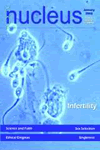One of the aspects of medicine I find most difficult is dealing with people who are hurting, whether this is physical pain or mental anguish. At times it seems horrific that as a student the moment at which a patient has their life turned upside down by a diagnosis, accident or other bad news must be seized upon as a learning experience. Perhaps I'll learn to come to terms with this but it's a sad fact that the lives of most of our patients will be fraught with painful experiences and hurt.
As Christian doctors we are in a uniquely privileged position, charged with bringing God's love and healing to those who are in need. One tremendous source of pain for almost one in eight couples in the UK is their inability to have children; many will stop at nothing to achieve their dream. In his article on infertility (pp13-21), CMF general secretary, Peter Saunders, outlines a Christian response to this problem. He looks at the treatment options that are available to couples seeking help as well as the ethics behind the various techniques. Reproductive technology is one of the fastest growing areas of medical science and opens the door to a bewildering world of new possibilities. Taking one particular example, Jacky Engel examines sex selection on pp2-4. As we enter the medical profession, it is vital that we stand firm in our faith and have a solid biblical viewpoint to draw upon when faced by developments such as this. Our 'Ethical Enigmas' series (pp36,37) is designed to help you think through some of the more tricky issues, this time covering teenage contraception.
Outside of medicine, there's no escaping the fact that we may well experience hurt in our own lives. Although the number of people living alone continues to rise, the issue of singleness is typically dealt with very badly by Christians and the church. However, drawing from her own experiences, CMF staffworker Becky Brain, tackles the sticky subject head on in her article on pp30-35.
In a world that fails to acknowledge the existence of God, suffering seems meaningless. This can be all the more heartbreaking for us as Christians who believe that the universe points towards God our father. In his article, 'Science and the Christian Faith' (p22-29) Bernard Palmer outlines some amazing truths about God's creation and emphatically destroys the myth that science and Christianity are incompatible. We can be confident that we do have a creator who designed us for relationship with him and his love for us is perfectly exemplified on the cross. Pain is an inevitable consequence of our fallen world and this side of heaven we may never know the reasons behind it, but we can be confident that he identifies with us, as he shares in our suffering through Jesus.
As Christian doctors we are in a uniquely privileged position, charged with bringing God's love and healing to those who are in need. One tremendous source of pain for almost one in eight couples in the UK is their inability to have children; many will stop at nothing to achieve their dream. In his article on infertility (pp13-21), CMF general secretary, Peter Saunders, outlines a Christian response to this problem. He looks at the treatment options that are available to couples seeking help as well as the ethics behind the various techniques. Reproductive technology is one of the fastest growing areas of medical science and opens the door to a bewildering world of new possibilities. Taking one particular example, Jacky Engel examines sex selection on pp2-4. As we enter the medical profession, it is vital that we stand firm in our faith and have a solid biblical viewpoint to draw upon when faced by developments such as this. Our 'Ethical Enigmas' series (pp36,37) is designed to help you think through some of the more tricky issues, this time covering teenage contraception.
Outside of medicine, there's no escaping the fact that we may well experience hurt in our own lives. Although the number of people living alone continues to rise, the issue of singleness is typically dealt with very badly by Christians and the church. However, drawing from her own experiences, CMF staffworker Becky Brain, tackles the sticky subject head on in her article on pp30-35.
In a world that fails to acknowledge the existence of God, suffering seems meaningless. This can be all the more heartbreaking for us as Christians who believe that the universe points towards God our father. In his article, 'Science and the Christian Faith' (p22-29) Bernard Palmer outlines some amazing truths about God's creation and emphatically destroys the myth that science and Christianity are incompatible. We can be confident that we do have a creator who designed us for relationship with him and his love for us is perfectly exemplified on the cross. Pain is an inevitable consequence of our fallen world and this side of heaven we may never know the reasons behind it, but we can be confident that he identifies with us, as he shares in our suffering through Jesus.
































